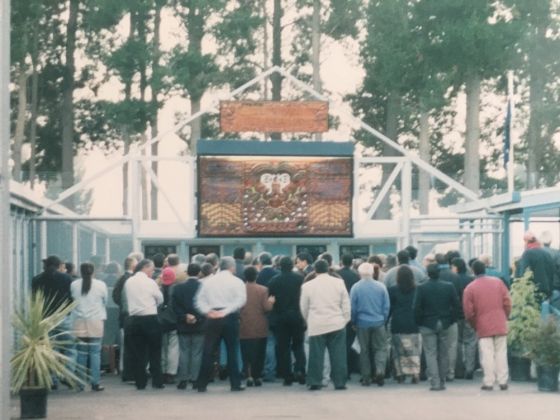Te Tirohanga Whakapapa

20 October 2020
“It was ground-breaking. It was awesome. The wairua was absolutely wonderful,” says Māori Services Manager Barney Tihema.
He’s talking about the day in 1997 when Te Tirohanga opened at Hawke’s Bay Regional Prison – the first Māori focus unit in the country.
“We had developed a good relationship with the mana whenua and so we booked their marae for the night where our visitors coming from out of town for the opening could stay.
“At 4 o’clock in the morning we were all up for the opening. What a wonderful feeling to get up early in the morning – the pūtātara sounded, the wero, the full-on haka powhiri. The responses and the challenges that came back from the manuhiri were awesome.
“Finally, we had the opportunity to open a kaupapa Māori environment."
Barney has worked for Ara Poutama Aotearoa for 31 years. When Te Tirohanga opened, he was Regional Adviser Māori Service Development, and later became the unit manager.
He recalls the development of Te Tirohanga – some big thinkers from te ao Māori were involved, including some who had been involved in te reo Māori education movement.
“In many ways, Te Tirohanga was modelled on kohanga reo and kura kaupapa – we wanted to have a space where we could create a kaupapa Māori environment and offer things like kapa haka, whakairo, raranga, tikanga and te reo Māori. We have had exceptional and dedicated providers who have delivered these services over a number of years.
“I’ve had many ‘wow’ moments during my involvement with Te Tirohanga over the years, including the opportunity to take tāne from the prison and hand them back to their whānau at the marae.
“I’ve been blessed to take part in a number of noho (live-ins) where we spend time with men from such different backgrounds and watch how they recognise and acknowledge that there is a better pathway out there for them and their whānau.”
There are now five Māori focus units around the country and they have adopted the Te Tirohanga name as their network. Barney looks back at the opening as an important part of the Hōkai Rangi whakapapa.
“Hōkai Rangi incorporates te ao Māori worldview for better outcomes for Māori, and that is exactly what happened in Hawke's Bay nearly 25 years ago. The innovation shown there over many years is one of the reasons the region was selected as one of the two key trial areas for Māori Pathways.”
Hawke's Bay Regional Prison Director Leonie Aben says changes in line with Hōkai Rangi has meant staff on the site have been revisiting past initiatives including when Te Tirohanga was established.
“In Māori, we look back to the future. Our word for the past ‘mua’ is the same as our word for the front. Hōkai Rangi and Māori Pathways gives us the opportunity to revisit the narrative from all those years ago and think about how we carry those aspirations forward.”
Māori Pathways Hawke's Bay Manager Tatiana Greening says the Māori Pathways team has been drawing on the prison’s many years’ experience as it works on ways to improve the journey through the corrections system for young Māori.
“Staff here apply Hōkai Rangi in their mahi in so many ways. This has a lot to do with how our prison director Leonie leads by the values. Staff are committed to supporting men in our care and all of that will contribute to successful pathways.
“Te Tirohanga developed the first version of our whānau plans and set the foundation for tāne and whānau-centred approaches many years ago. They have been helping men identify goals for themselves and their whānau.
“That set-up a foundation that Māori Pathways is now able to build on. We have further developed a prototype for those plans, and we have more certainty we have resourcing to help turn them into reality.
“The other area that Te Tirohanga has done exceptionally well is reaching into the community with their pivotal roles of Pou-Arataki and Kai Whakamana. We are learning a lot from that as we work to develop a navigator workforce to support tāne once they are back in the community,” Tatiana says.

